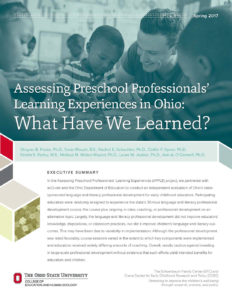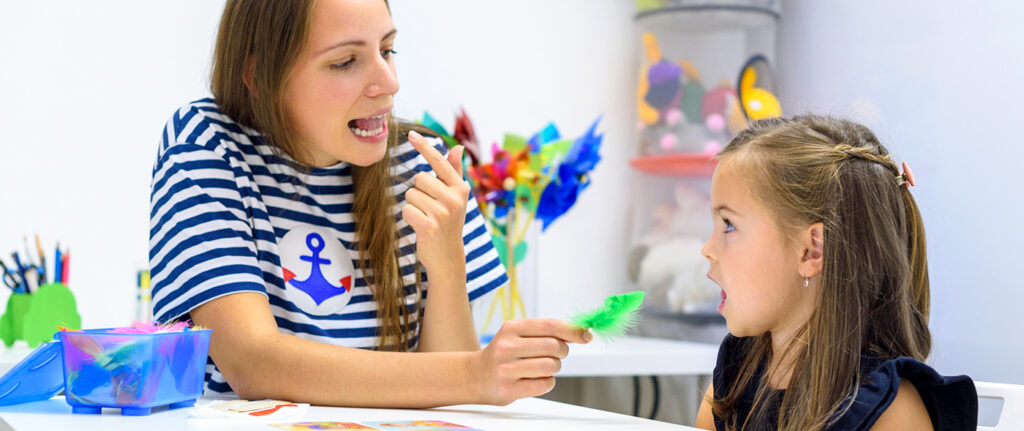Professional development allows early childhood educators to advance their knowledge, skills, and classroom practices to ultimately improve outcomes for children. Because of this, across the state, professional development is included in requirements for licensing and program evaluations.
With so much emphasis on professional development and state funds investing in providing opportunities to early childhood providers, understanding the return on the investment and overall effectiveness is important. In 2017, Crane researchers Dr. Shayne Piasta and Dr. Laura Justice received funding from the U.S. Department of Education’s Institute of Education Sciences to evaluate the state’s sponsored language and literacy professional development. The project was called Assessing Preschool Professionals’ Learning Experiences (APPLE: Ohio). Crane researchers examined not only educator knowledge, classroom dispositions, and classroom practices, but they also examined the children’s language and literacy outcomes.
While the professional development did not realize intended effects, additional analyses of study data have yielded important insights into early childhood teachers’ knowledge and beliefs about language and literacy, language and literacy learning opportunities in early childhood classrooms, and children’s early literacy learning.
ACKNOWLEDGEMENTS:
We would also like to acknowledge our additional team members, including co-investigators Ann O’Connell and Dennis Sykes; the ecQ-net team; postdoctoral researchers Christina Yeager Pelatti, Rachel Schachter, Caitlin Spear, and Jennifer Ottley; graduate research assistants Melissa Weber-Mayrer, Kristin Farley, and Susan Mauck; and graduate students Pamela Soto Ramirez, Tara Strang, Somin Park, and Gloria Yeomans-Maldonado.
Crane Center publications on this work
Principal investigator Dr. Shayne Piasta co-authored a white paper on the findings of the APPLE: Ohio research project in order to showcase the findings and share recommendations for researchers, policy makers, and practitioners.
In Assessing Preschool Professionals’ Learning Experiences (APPLE: Ohio), Crane researchers partnered with ecQ-net and the Ohio Department of Education to conduct an independent evaluation of Ohio’s state-sponsored language and literacy professional development for early childhood educators. Participating educators were randomly assigned to experience the state’s 30-hour language and literacy professional development course, the course plus ongoing in-class coaching, or professional development on an alternative topic.
FINDINGS: Largely, the language and literacy professional development did not improve educators’ knowledge, dispositions, or classroom practices, nor did it improve children’s language and literacy out- comes. This may have been due to variability in implementation. Although the professional development was rated favorably, course sessions varied in the extent to which key components were implemented and educators received widely differing amounts of coaching. Overall, results caution against investing in large-scale professional development without evidence that such efforts yield intended benefits for educators and children.
Crane researchers sought to examine how educators’ backgrounds may be linked to the amount of language and literacy instruction they provide.
Specifically, the researchers looked at the following background factors of educators:
-
-
- knowledge about the structure of language and how to teach language and literacy to children,
- beliefs about language and literacy instruction,
- educational attainment, and
- years of prior teaching experience.
-
Results of this study highlight several important findings about educator backgrounds and their language and literacy instruction in preschool settings.
Impact Studies
This project resulted in multiple published papers. To learn more details about APPLE: Ohio, check out the two peer-reviewed impact studies.
“At-scale, state-sponsored language and literacy professional development: Impacts on early childhood classroom practices and children’s outcomes” published in the Journal of Educational Psychology
“Effectiveness of Large-Scale, State-Sponsored Language and Literacy Professional Development on Early Childhood Educator Outcomes” published in the Journal of Research on Educational Effectiveness
Publications and Media
Many additional published works stemmed from APPLE: Ohio’s research, check out the additional research articles and podcast episode.
“Early childhood educators’ knowledge about language and literacy: Associations with practice and children’s learning” published in Dyslexia
“What Happens During Language and Literacy Coaching? Coaches’ Reports of Their Interactions With Educators” published in Early Education and Development
“Examining Early Childhood Language and Literacy Learning Opportunities in Relation to Maternal Education and Children’s Initial Skills” published in Journal of Education for Students Placed at Risk (JESPAR)
“Early Childhood General and Special Educators: An Examination of Similarities and Differences in Beliefs, Knowledge, and Practice” published in the Journal of Teacher Education
“An Investigation into the Curricula (and Quality) Used by Early Childhood Educators” published in theHead Start Dialog
“Exploring the nature of associations between educators’ knowledge and their emergent literacy classroom practices” published in Reading and Writing
“Early childhood literacy coaching: An examination of coaching intensity and changes in educators’ literacy knowledge and practice” published in Teaching and Teacher Education
“Assessing and predicting small-group literacy instruction in early childhood classrooms” published in Early Education and Development
“Early childhood educators’ knowledge, beliefs, experiences, and children’s language- and literacy-learning opportunities: What is the connection?” published in Early Childhood Research Quarterly
“The nature and extent of change in early childhood educators’ language and literacy knowledge and beliefs” published in Teaching and Teacher Education,
“State-sponsored professional development for early childhood educators: Who participates and associated implications for future offerings” published in Journal of Early Childhood Teacher Education
“Language and literacy learning opportunities in early childhood education classrooms: Typical experiences and within-classroom variability” published in Early Childhood Research Quarterly
“The effects of language- and literacy-focused professional development on early educators and children: A best-evidence meta-analysis” published in Early Childhood Research Quarterly
“All for Literacy Podcast” episode: Evidence-based implementations (Episode 10)



